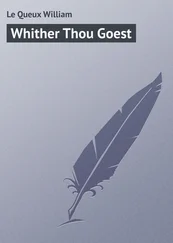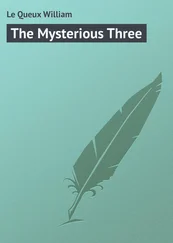William Le Queux - If Sinners Entice Thee
Здесь есть возможность читать онлайн «William Le Queux - If Sinners Entice Thee» — ознакомительный отрывок электронной книги совершенно бесплатно, а после прочтения отрывка купить полную версию. В некоторых случаях можно слушать аудио, скачать через торрент в формате fb2 и присутствует краткое содержание. Жанр: foreign_prose, на английском языке. Описание произведения, (предисловие) а так же отзывы посетителей доступны на портале библиотеки ЛибКат.
- Название:If Sinners Entice Thee
- Автор:
- Жанр:
- Год:неизвестен
- ISBN:нет данных
- Рейтинг книги:4 / 5. Голосов: 1
-
Избранное:Добавить в избранное
- Отзывы:
-
Ваша оценка:
- 80
- 1
- 2
- 3
- 4
- 5
If Sinners Entice Thee: краткое содержание, описание и аннотация
Предлагаем к чтению аннотацию, описание, краткое содержание или предисловие (зависит от того, что написал сам автор книги «If Sinners Entice Thee»). Если вы не нашли необходимую информацию о книге — напишите в комментариях, мы постараемся отыскать её.
If Sinners Entice Thee — читать онлайн ознакомительный отрывок
Ниже представлен текст книги, разбитый по страницам. Система сохранения места последней прочитанной страницы, позволяет с удобством читать онлайн бесплатно книгу «If Sinners Entice Thee», без необходимости каждый раз заново искать на чём Вы остановились. Поставьте закладку, и сможете в любой момент перейти на страницу, на которой закончили чтение.
Интервал:
Закладка:
“My darling – my darling – my own darling!” he cried, triumph in his voice, and passionate joy in his eyes. “You love me – you love me!”
But again she drew herself away from him, then turned aside, held her breath, and shuddered. The lace ruffles on her bosom slowly rose and fell. The movement was as though she were shrinking from him with repulsion. But it was only momentary, and he did not notice it. Next instant she again turned, lifting her clear grey eyes to his with their frank innocent gaze.
“Yes,” she said, almost in a whisper, “I love you.”
Chapter Four
Hairpins
The tragedy caused the greatest excitement in the neighbourhood. Journalistic artists, those industrious gentlemen who produce such terribly distorted portraits, came from London and sketched the spot in Cross Lane and the exterior of Captain Brooker’s house. One had the audacity to call and request him to lend them a photograph of the murdered girl. This he declined, with a few remarks more forcible than polite, for he had been greatly annoyed by the continual stream of interviewers, who continually rang his bell. Hundreds of persons walked or drove over from Reading to view the spot where Nelly had been found, and in addition to the local detectives, Inspector Swayne, a well-known officer from Scotland Yard, had been sent down to direct the inquiries.
At the inquest, held at the King’s Head, two days later, it was expected by everybody that some interesting facts would be brought to light. Erle Brooker had never troubled to earn the good will of his neighbours, therefore they were now spitefully eager for any scandal that might be elicited, and long before the hour for which the jury had been summoned, congregated around the village inn. It was known that on the day following the tragedy the Captain had paid a mysterious visit to London, and the object of this trip had been a subject of much discussion everywhere. The murder of his adopted daughter had been a terrible blow to him, and when seen on his way to the station it was noticed that his face, usually smiling and good-humoured, wore a heavy, preoccupied look.
As he walked with Liane from his cottage to the inn, the crowd, gaping and hushed, opened a way for them to pass in; then, when they had entered, there was an outburst of sympathy and sneers, many of the latter reaching the ears of George Stratfield when, a few moments later, he followed them.
After a long wait, the Coroner at length took his seat, the jury were duly sworn, and the witnesses, ordered out of the crowded room, were ushered into a small ante-room, the table of which had recently been polished with stale beer. Here Liane introduced her lover to her father, and the men exchanged greetings. George, however, did not fail to notice the rustiness of the Captain’s shabby frock-coat, nor the fact that his black trousers were shiny at the knees; yet as they grasped hands, the ring of genuine bonhomie about his voice favourably impressed him. By his tone and manner George instinctively knew that Erle Brooker, the man against whom his dead father entertained such an intense dislike, was a gentleman.
“Our meeting is in very tragic circumstances, Mr Stratfield,” the Captain observed huskily, his grave face unusually pale. “They told me that you had discovered poor Nelly, but I had not the pleasure of your acquaintance, although I had, of course, heard of you often from the villagers.”
Liane and George looked at one another significantly.
“I must regret your sad bereavement, and both you and Liane have my sincerest sympathy,” the young man answered.
The Captain glanced quickly at the Baronet’s son with a strange, puzzled expression. He had spoken of his daughter familiarly by her Christian name, and evidently knew her well. He had not before suspected this.
At that moment, however, the door opened, and a constable putting his head inside called his name. In obedience to the policeman’s request he rose and followed him into the room wherein the court of inquiry had assembled. Having advanced to the table and been sworn, the Coroner addressing him, said, —
“Your name is Captain Erle Brooker, late of the Guards, I believe?”
“Yes.”
“And you identify the body of the deceased. Who was she?”
“Helen Mary Bridson, daughter of a brother officer, Captain Bridson. She was left an orphan eleven years ago, and I brought her up.”
“Did her father die in London?”
“No, on the Continent.”
“Had she no relatives on her mother’s side?”
The Captain slowly stroked his moustache, then answered.
“I knew of none.”
“Were you acquainted with her mother?”
“No, I was not,” he replied after a moment’s reflection.
“And you have no suggestion to make, I suppose, regarding any person who might have entertained ill-will towards the unfortunate girl?” inquired the grey-haired Coroner.
“None whatever.”
“When did you last see her alive?”
“On Monday evening, when she accompanied a visitor to the station to see him off on his return to London. She rode her cycle, and announced her intention of going on to Burghfield to make a purchase. She was found later on,” he added, hoarsely.
“Who was this visitor? What was his name?”
“He was a friend, but I decline to give his name publicly,” the Captain replied firmly. “I will, however, write it for your information, if you desire,” and taking a pencil from his pocket he wrote the name of Prince Zertho d’Auzac and handed it to the Coroner.
The eager onlookers were disappointed. They had expected some sensational developments, but it seemed as though the crime was too enshrouded in mystery to prove of any very real interest. They did not, however, fail to notice that when the Coroner read what the Captain had written, an expression of astonishment crossed his face.
“Are you certain that the – this gentleman – left by the train he went to catch?” he asked.
“Quite,” answered Brooker. “Not only have the police made inquiry at my instigation, but I have also accompanied a detective to London, where we found my visitor. Inspector Swayne, as a result of his investigations, was entirely satisfied.”
“Had the unfortunate young lady any admirer?”
“I think not.”
“Then you can tell us absolutely nothing further?” observed the Coroner, toying with his quill.
“Unfortunately I cannot.”
The Captain, after signing his depositions, was directed to one of a row of empty chairs near the Coroner’s table, and his daughter was called.
Liane, pale and nervous, neatly dressed in black, entered quietly, removed her right glove, and took the oath. Having given her name, the Coroner asked, —
“When did you last see the deceased, Miss Brooker?”
“When she set out to go to the railway station,” she answered, in a low faltering voice.
“Have you any idea why she should have gone to Cross Lane? It was entirely out of her way home from Burghfield to Stratfield Mortimer, was it not?”
“I cannot tell,” Liane replied. “We went along that road on our cycles only on one occasion, and found it so rough that we agreed never to attempt it again.”
“I presume, Miss Brooker, that the deceased was your most intimate friend?” observed the Coroner. “She would therefore be likely to tell you if she had a lover. Were you aware of the existence of any such person?”
“No,” she replied, flushing slightly and glancing slowly around the hot, crowded room.
“You had a visitor whose name your father has just given me upon this paper,” observed the Coroner. “Was that visitor known to the deceased?”
The eyes of the father and daughter met for a single instant as she glanced around upon the long lines of expectant countenances.
Читать дальшеИнтервал:
Закладка:
Похожие книги на «If Sinners Entice Thee»
Представляем Вашему вниманию похожие книги на «If Sinners Entice Thee» списком для выбора. Мы отобрали схожую по названию и смыслу литературу в надежде предоставить читателям больше вариантов отыскать новые, интересные, ещё непрочитанные произведения.
Обсуждение, отзывы о книге «If Sinners Entice Thee» и просто собственные мнения читателей. Оставьте ваши комментарии, напишите, что Вы думаете о произведении, его смысле или главных героях. Укажите что конкретно понравилось, а что нет, и почему Вы так считаете.












